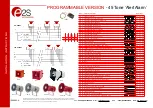
LAUNCH
629 User's Manual
9
www.x431.com +86 755 8455 7891
refers to much more gradual adjustments to the fuel calibration schedule than
short-term trim adjustments. These long-term adjustments compensate for
vehicle differences and gradual changes that occur over time.
2.6 OBD II Monitors
An important part of a vehicle’s OBD II system is the Readiness Monitors,
which are indicators used to find out if all of the emissions components have
been evaluated by the OBD II system. They are running periodic tests on
specific systems and components to ensure that they are performing within
allowable limits.
Monitor operation is either “Continuous” or “Non-Continuous,” depending on
the specific monitor.
2.6.1 Continuous Monitors
Some of the vehicle components or systems are continuously tested by the
vehicle’s OBD II system, while others are tested only under specific vehicle
operating conditions. The continuously monitored components listed below are
always ready:
1. Misfire Monitor
This Monitor continuously checks for engine misfires. A misfire occurs when
the air-fuel mixture in the cylinder does not ignite. The misfire Monitor uses
changes in crankshaft speed to sense an engine misfire. When a cylinder
misfires, it no longer contributes to the speed of the engine, and engine speed
decreases each time the affected cylinder(s) misfire. The misfire Monitor
is designed to sense engine speed fluctuations and determine from which
cylinder(s) the misfire is coming, as well as how bad the misfire is.
There are three types of engine misfires, Types 1, 2, and 3.
• Type 1 and Type 3 misfires are two-trip monitor faults. If a fault is sensed
on the first trip, the computer temporarily saves the fault in its memory as
a Pending Code. The MIL is not commanded on at this time. If the fault is
found again on the second trip, under similar conditions of engine speed,
load and temperature, the computer commands the MIL “On,” and the code
is saved in its long term memory.
• Type 2 misfires are the most severe type of misfire. When a Type 2 misfire
is sensed on the first trip, the computer commands the MIL to light when
the misfire is sensed. If the computer determines that a Type 2 misfire is
severe, and may cause catalytic converter damage, it commands the MIL
Summary of Contents for Creader 629
Page 1: ...V1 00 001 05 27 2020...















































